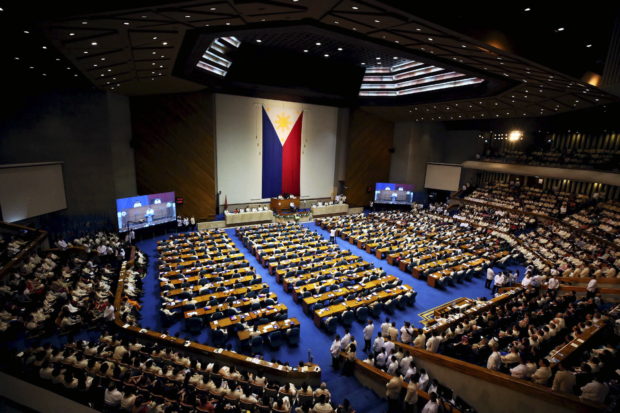Minority solons question need for sovereign wealth fund

Batasang Pambansa plenary. —MALACAÑANG FILE PHOTO
MANILA, Philippines — At least two members of the House of Representatives Minority bloc questioned the necessity of the proposed sovereign wealth fund (SWF) given that the national budget is usually in a deficit and the country faces trillions-worth of debt.
In the hearing of the House Committee on banks and financial intermediaries on Thursday, Alliance of Concerned Teachers (ACT) Rep. France Castro asked why the proponents of the Maharlika Investment Fund (MIF) are so eager to create an SWF when the basic needs of some Filipinos are not even attended to.
Last November 28, it was revealed that Speaker Ferdinand Martin Romualdez and other lawmakers filed House Bill No. 6398, which seeks to establish the MIF, which the government would use to make its own investments in infrastructure, industries, and other sectors.
READ: Romualdez, other solons call for Maharlika Investment Fund for gov’t investment
Article continues after this advertisementBut Castro stressed that the P13-trillion debt of the country itself should already deter the government from allocating other funds to the MIF.
Article continues after this advertisement“My fear here is that we would use the money of our government employees and workers in the private sector, which is quite big, for investments. And we all know, Mr. Chair, that investments have winners and losers. So we have to look at that perspective also, and we would also have funds from taxpayers’ money,” the ACT representative said in a mix of English and Filipino.
“Of course, if we say that the government would guarantee, that’s still the people’s money, right? So that is what we have been saying […] where would the government get the money to guarantee when we have a P13 trillion na debt, we have so many borrowings, and then our people are constantly looking for cash assistance,” she added.
Albay 2nd District Rep. Joey Salceda, chair of the House Committee on ways and means, meanwhile defended the MIF proposal, saying that the Philippines already has one of the most conservative debt-to-gross domestic product (GDP) ratios — hence it could not be used as a reason to scare people off from the proposal.
Committee on appropriations senior vice chair and Marikina 2nd District Rep. Stella Quimbo also assured that state-owned insurers like GSIS and SSS would only invest the amount of money that is excess from what it is scheduled or predicted to disburse for the year.
“The 60 percent is one of the lowest debt-to-GDP all over the world, so actually, the Philippines is conservative. Let us not use that to scare ourselves,” Salceda said.
“I was also a teacher, I was long part of GSIS, and of course, it is very important that we protect the funds of employees. But as far as I know with fund management, what they would be marked as an investable portion of the fund is what would be in excess of the expected benefit payment to members yearly,” Quimbo added.
Counter-intuitive?
But aside from Castro, Senior Deputy Minority Leader and Northern Samar 1st District Rep. Paul Daza asked for the principle behind the SWF, saying that the Philippines is borrowing funds to fill in the General Appropriations Act, or the national budget for the corresponding year.
This means the government is looking for a surplus fund to allocate to the SWF or the MIF, even if it means taking from the borrowed funds — which can already be let go.
“What is the principle behind allowing the funding of the sovereign fund from the General Appropriations Act when the very spirit and essence of such a fund is really the excess wealth, surplus of the government?” Daza said.
“Our GAA is always deficit-funded, we essentially would be borrowing to fund the GAA, and then you’re gonna allow putting money into the sovereign fund? Isn’t that counter-intuitive?” he asked.
In response, Salceda said that this would be good if there is fiscal space, especially as Congress usually cuts or removes funding for big-ticket projects like dams, digitalization, and other high-cost and high-yield infrastructure projects to focus more on public services.
Salceda also said that he understands why President Ferdinand Marcos Jr. — who has openly expressed support for the proposal — thought that the MIF would be important to ensuring growth.
READ: Maharlika fund has Marcos go signal – Diokno
“It’s counter-intuitive, but if there’s fiscal space, why not? It’s just an allowance, a leeway. For example, if we go in excess of flood control programs, then we would have no problems if we place this on the MIF, because, you know, just to give you an idea: the whole idea here is the President wanted a fund because under the GAA, if they place money on dams, NBN, we remove it,” he said.
“So this is really a presidential aspiration to finance grids, dams, national broadband, which are always by tradition of this Congress, relocated to the unprogrammed. So I understand the presidential motivation for this, strategic wealth fund,” he added.